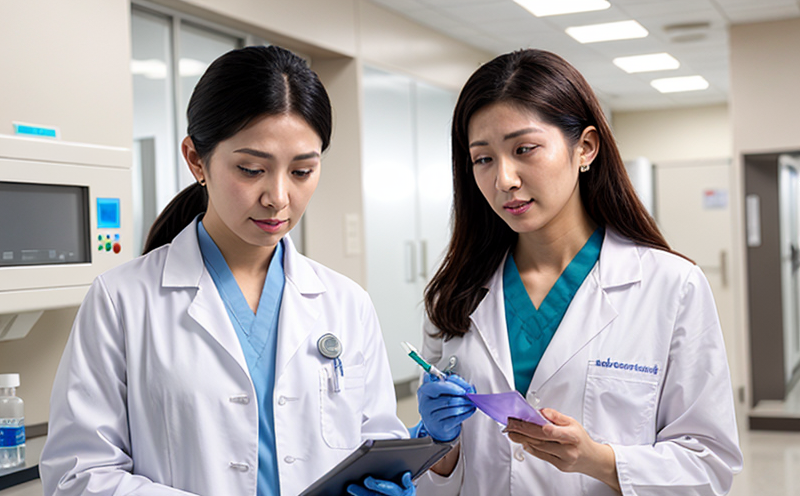Bioassay Potency Testing of Biosimilars by Cell Culture
The bioassay potency testing of biosimilars by cell culture is a critical step in ensuring the safety, efficacy, and quality of biopharmaceuticals. This method involves using living cells to determine the biological activity of a drug substance or product. The process is particularly crucial for biosimilars due to their complex structure and need for precise potency assessment.
Cell culture bioassays are used to measure the biological activity of a molecule by observing its effect on target cells or tissues. This method is preferred over other analytical techniques because it provides an accurate representation of how the drug will behave in vivo. The testing process typically involves incubating the sample with cells under controlled conditions and measuring the response. Key parameters include cell viability, growth rates, and functional activity.
The bioassay potency test is governed by international standards such as ISO 17825 and ASTM F2837. These standards ensure that the test is performed consistently across different laboratories, thereby enhancing comparability of results.
In the pharmaceutical industry, bioassay potency testing plays a vital role in ensuring product quality and consistency. It helps in identifying any deviations from expected performance early on, allowing for timely corrective actions. This process is especially important for biosimilars as they are designed to be highly similar to reference biologics but may still exhibit some differences due to manufacturing processes.
The testing procedure begins with careful sample preparation and storage to maintain the integrity of the biological material. Once prepared, the samples undergo a series of steps including inoculation into cell cultures, incubation, and subsequent analysis of the cellular response. The results obtained from these tests are then used to determine the potency of the biosimilar.
Cell culture bioassays offer several advantages over other methods. They provide more accurate representations of in vivo effects compared to in vitro assays that only measure chemical properties. Additionally, they can detect subtle differences between similar products which is essential for regulatory approval processes.
- Potency determination
- Detection of impurities and contaminants
- Assessment of stability over time
- Evaluation of efficacy in clinical trials
The precision and accuracy of these tests are paramount, especially given the high stakes involved in pharmaceutical development. Regulatory authorities worldwide recognize the importance of robust bioassay methods, making this testing approach a cornerstone of modern biopharmaceutical research.
Benefits
- Accurate assessment of biological activity
- Potential to identify impurities and contaminants early in the development process
- Enhanced reliability through standardized procedures aligned with international standards
- Facilitation of regulatory compliance ensuring product safety and efficacy
- Precision measurement facilitating better understanding of product performance across various conditions
The use of cell culture bioassays not only enhances the quality control process but also contributes significantly to the development of safer, more effective medicines. By providing detailed insights into how a drug behaves in real-world scenarios, these tests help bridge the gap between laboratory research and clinical application.
Why Choose This Test
- Regulatory compliance: International standards such as ISO 17825 ensure consistent testing across different laboratories.
- Precision and accuracy: Cell culture bioassays provide detailed insights into the biological activity of a substance, offering more reliable results than other methods.
- Efficiency: This approach can detect subtle differences between similar products early in the development process, allowing for quicker identification and resolution of issues.
- Comprehensive evaluation: By assessing multiple aspects like potency, stability, and efficacy, this method offers a holistic view of product performance.
Selecting cell culture bioassays as part of your testing regimen can significantly enhance the quality and reliability of your biopharmaceuticals. It ensures that you meet stringent regulatory requirements while also contributing to advancements in medical science by providing accurate and comprehensive data on new treatments.
Quality and Reliability Assurance
Ensuring the quality and reliability of pharmaceutical products is paramount, particularly for complex molecules like biopharmaceuticals. The bioassay potency testing by cell culture method plays a crucial role in this regard by offering precise measurements that reflect how the drug will perform in vivo.
The process begins with rigorous sample preparation and storage to preserve the integrity of the biological material. Samples are then inoculated into appropriate cell lines, typically derived from human sources, ensuring compatibility and relevance for clinical use. Incubation periods vary depending on the specific test requirements but generally last several days or even weeks.
During this time, meticulous monitoring occurs using advanced instrumentation capable of detecting minute changes in cellular behavior indicative of biological activity. Techniques such as enzyme-linked immunosorbent assays (ELISAs), flow cytometry, and Western blotting are commonly employed to quantify the response accurately.
The data collected during these experiments form the basis for calculating potency values according to predefined criteria established by regulatory bodies like the FDA or EMA. These values represent the relative strength of the drug compared to a reference standard, enabling comparisons between different batches or formulations.
A robust quality assurance framework is essential when performing bioassay potency tests. This includes adhering strictly to protocols outlined in relevant standards such as ISO 17825 and ASTM F2837. Regular calibration of equipment ensures precision while cross-validation with alternative methods provides additional confidence in results.





